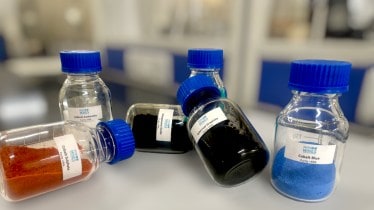India’s ambition to become an electric vehicle powerhouse has a lot of potential, but the lack of the critical raw materials required for lithium batteries can be a dampener. This exactly is the challenge Bengaluru-based cleantech start-up Minimines aims to solve.
While lithium-ion batteries have been around for decades and evolved a lot in consumer electronics, their applications at a larger scale is still in its nascency. Then there is the challenge of procuring these critical raw materials, especially for Indian players, given that the vast majority of the lithium-ion raw materials are sourced from outside India.
MiniMines with its patented recycling technology claims to be able to recycle and recover 96 percent of raw materials from lithium batteries.
L-R: Anupam Kumar, Co-Founder & CEO, MiniMines and Arvind Bharadwaj, CTO & Co-Founder, Minimines.
“The challenges with raw materials persist today, much as they did three years ago. The wait time for raw materials remains at 4-5 months, and any discrepancies or changes in parameters entail an additional 6-8 months of waiting. This constraint is particularly challenging with critical vendors,” said Anupam Kumar, Co-Founder & CEO, MiniMines.
He along with Arvind Bharadwaj, CTO & Co-Founder, started the MiniMines journey in 2020.
Recycling and recovering isn’t a new subject for Kumar, who had plenty of experience working at the Bhabha Atomic Research Centre (BARC), where he focused on recovery of uranium, cobalt, and nickel from washed nickel waste. Similarly, Bhardwaj’s expertise in nanomaterials and previous work led to both of them working together at Log9 Materials.
Interestingly, during their stint at Log9 Materials they worked on various battery chemistries, which resulted in a lot of discarded batteries. This is where they saw first-hand the delays due to ordering the raw materials for these prototype production, causing a lengthy wait of 6-7 months for their arrival at the facility. Bhardwaj and Kumar understood the importance of building a robust supply chain in the country that could help mitigate this challenge.
“During that moment, both of us felt a profound calling, as if it was meant to be a significant venture for us. At that juncture, we referred to ourselves as recyclers, as the name MiniMines had not yet crossed our minds. Our fundamental vision was clear: to offer a diverse range of sustainable raw materials for the production of various innovative devices,” shared Kumar.
Recovering 96% of elemental compounds
Kumar claims that at this point-of-time “MiniMines stands as the sole company equipped with the capability to recover elemental compounds. This unique competency sets us apart, distinguishing us as pioneers in this field with no parallel entities in the country.”
The company’s approach involves three critical processes: extraction, selective separation, and beneficiation. In the extraction phase, the black mass containing intercalated nickel and cobalt is processed to recover the elements in a singular medium where all components are present. Subsequently, the selective separation process comes into play. Leveraging the scientific fundamental principle that each block element possesses different solubility under varying conditions of temperature, pH, and pressure. It then selectively separates the desired elements. This intricate combination of processes contributes to the overall efficiency and success of its technology.
“To offer a comprehensive overview, our operational scale is significant, currently standing at 1,500-tonne with a planned expansion to 3,000-tonne within the next 6-8 months. This capacity equates to processing approximately 1500 tonne of batteries annually. Our scale surpasses that of many others in the industry,” stated Kumar.
“We have projected that our recycling capacity will significantly increase in the next 18 months, reaching approximately 2,500-3,000 tonne per annum. Our aim is to recycle 15,000 tonne of waste batteries in next 4 years and extract elemental compound to power 66 lakh electric vehicles,” claimed Kumar.
According to Bhardwaj, the company will be able to support 20-25 percent of India’s demand for the critical elements in the next two years,“This demand extends beyond lithium-ion batteries, including applications such as high-temperature grease for various industries.”
Growth plans
Currently, Minimines is engaging with three key stakeholders – sourcing, servicing, and product-oriented.
On the product side, their output comprises elemental content alongside cathode active material. It goes beyond elemental recovery, and Minimines specialises in producing cathode activity, a blend of nickel, cobalt, and manganese.
Kumar further explained that sourcing raw materials from Minimines would be “way cheaper and consume less energy. For instance, for one tonne of ore processing, you get approximately 1.8kg of lithium carbonate, but when you process one tonne of waste lithium-ion battery you generate approximately around 17-50kg of lithium carbonate.”
The company has already invested around Rs 6.5 crore towards setting up its recycling unit in Bengaluru, self-funded through various grants. It now aims to “invest around Rs 20-25 crore to further enhance its production capabilities.”
Going forward, it aims to focus on setting up multiple collection and crushing plants across the country. These will act as a spoke model, from where raw materials will be transported back to Bengaluru for processing and recovery.
